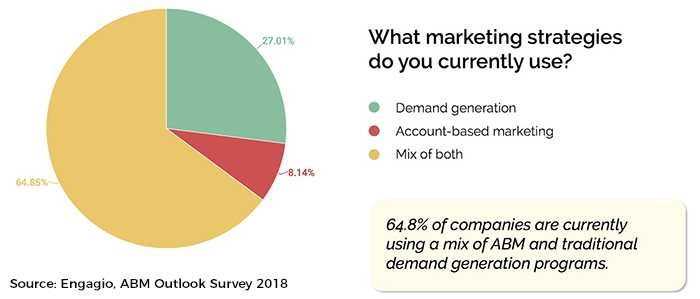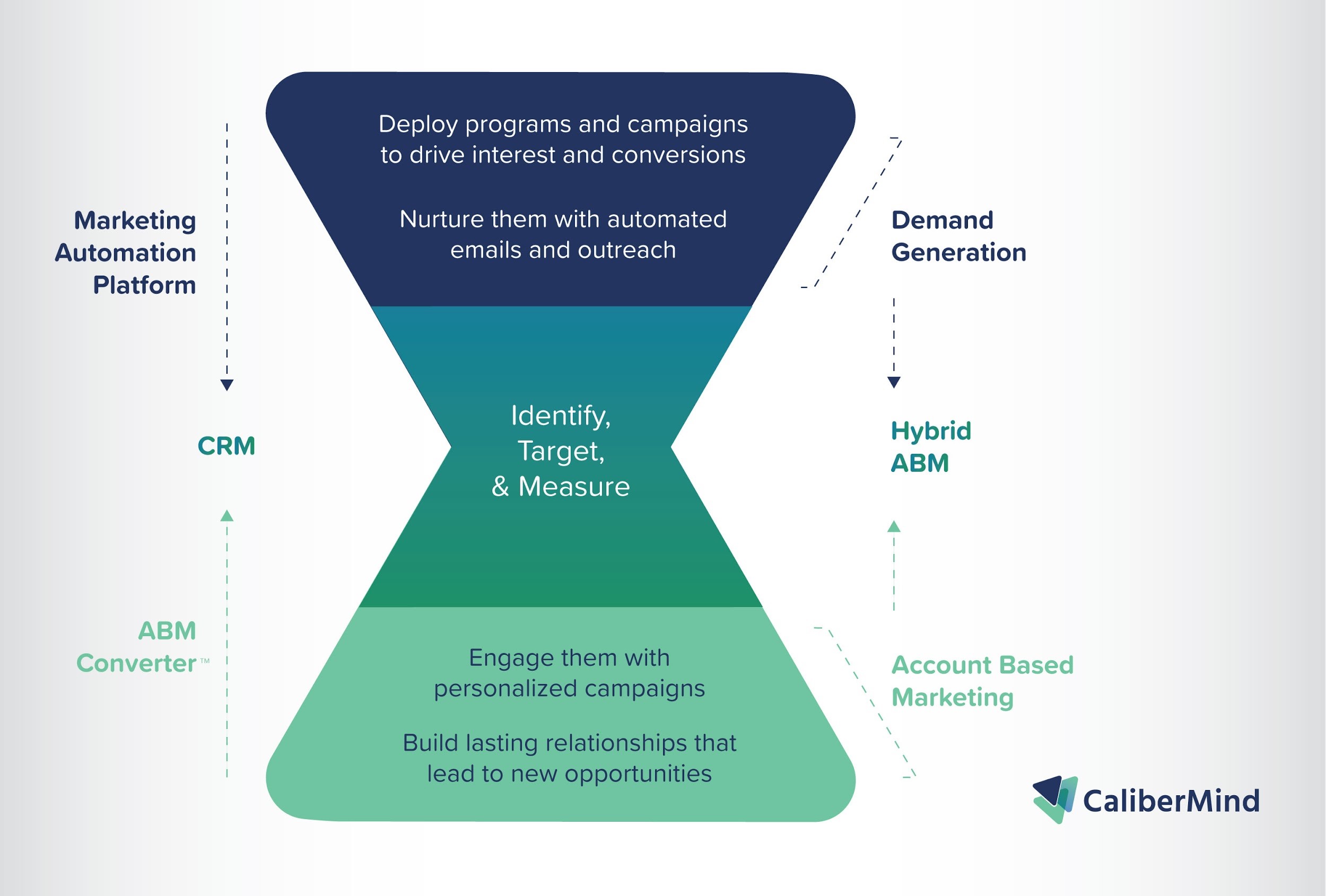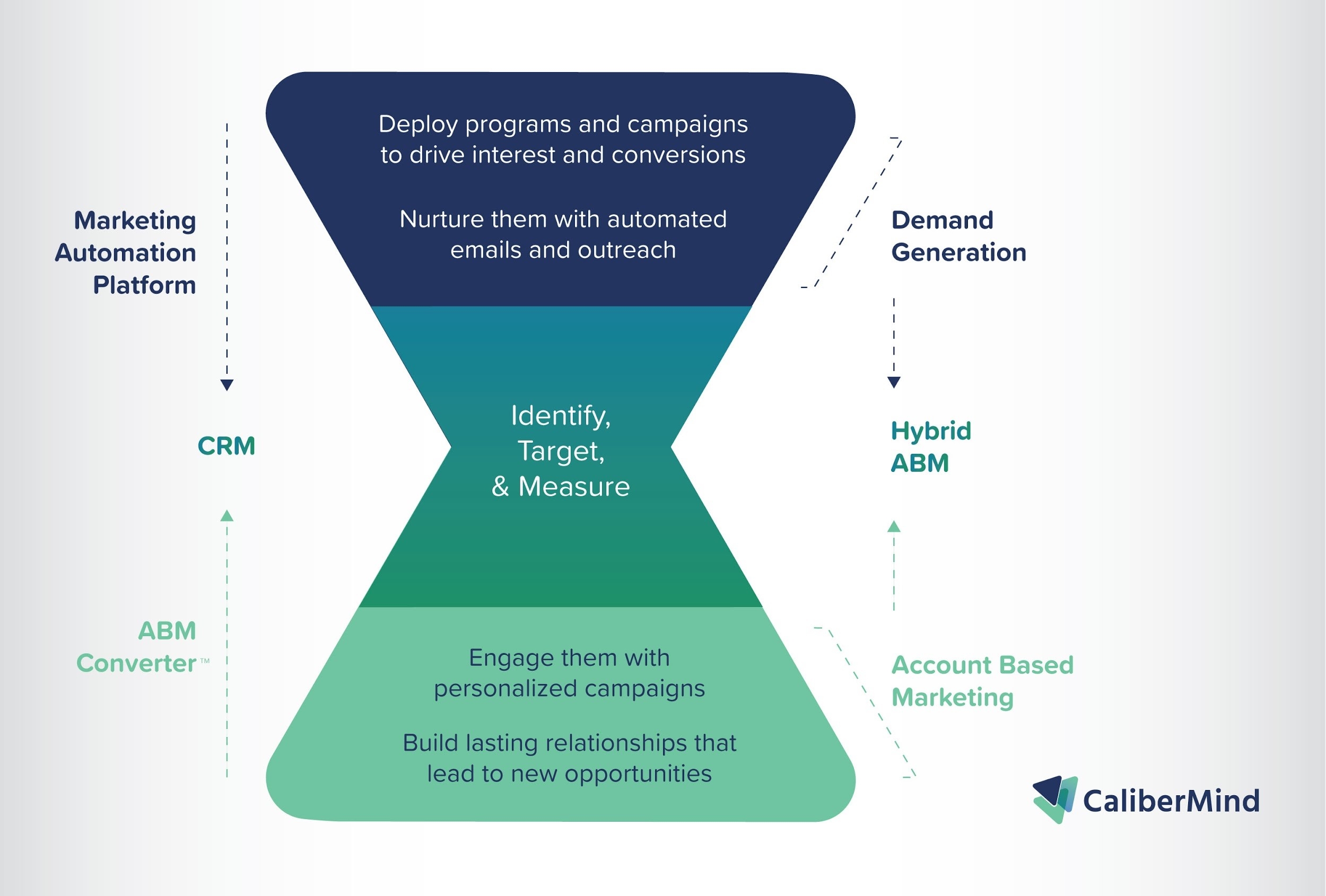While account-based marketing (ABM) has proven to deliver higher ROI than other types of marketing, if you use ABM by itself, you’re missing out on potential revenues. That’s because marketers also need inbound demand gen tactics to supplement and support ABM. In fact, 90% of the market is running either demand generation, or a mix of both demand gen and account-based marketing (ABM).

The problem is, these marketers don’t have one system that can handle both strategies. They’re either stuck with a traditional marketing automation platform, or a pricey ABM platform. But it doesn’t have to be that way.
You see, ABM is a data problem. For most ABM types, you don’t need to spend tens of thousands of dollars on a fully-featured ABM platform that takes months to implement. All you really need is your existing CRM, your marketing automation platform, and the ultimate not-so-expensive tool to bring it all together: an ABM Converter™.
With just these elements, you can #DoubleYourFunnel in days, without the hefty price tag.
Here’s How To #DoubleYourFunnel
Let’s start with an explanation of Hybrid ABM. The premise of Hybrid ABM is simple: Run demand generation and ABM side-by-side to get the revenue impact of targeted high-value accounts while still capturing inbound leads that have the potential to close quickly.

Once you wrap an ABM Converter™ around your CRM and marketing automation platform, this model really begins to scale, and that’s when you start to double your funnel. Here’s an example:
Fidelis Cybersecurity was just getting started with ABM and wanted a solution that would allow them to keep their existing lead-based system (Salesforce) and demand generation system (Marketo), while giving them the ability to manage and report on about 300 named accounts in their account-based funnel. But they didn’t want the big investment of an ABM platform.
“An ABM Converter™ allowed us to implement ABM in days instead of months,” said Moni Oloyede, Director of Marketing Operations at Fidelis Cybersecurity. “It also helped us enrich leads with account data, easily identify high-value prospects, and reduce research time for sales — all for a fraction of the cost of an ABM platform.”
Aptrinsic also wanted the power of ABM without the big platform overhead. Travis Kaufman, VP of Growth at Aptrinsic, talked about how they used an ABM Converter™ to convert their marketing automation platform (HubSpot).
“We were looking to execute an ABM strategy, but couldn’t justify spending tens of thousands of dollars on another platform after making such a big investment in our Marketing & Sales infrastructure. We already have the tools and data to execute ABM, we just needed to bring them together. Taking a Hybrid ABM approach allowed us to scale our ABM & Inbound strategies together using our existing MarTech stack ensuring the proper visibility to properly attribute our efforts with pipeline and revenue.
How #DoubleYourFunnel Works
Here are some ways you can double your funnel with an ABM Converter™:
- Identify named account lists. Using an ABM Converter™ for segmentation, you can uncover new prospect accounts that align with the rich attributes of your successful customer accounts. You can inform your target account selection with attributes like key technology data, intent data and clean industry and company size data.
- Identify decision-makers and build personas. If you’re running separate lead gen and ABM systems, it’s hard to know if you have sufficient data, opt-ins contacts and persona coverage for each target account. An ABM Converter™ can identify decision-makers and map buyer personas directly from your CRM data.
- Map leads to accounts. The Salesforce data schema makes getting account data on leads an operational headache. An ABM Converter™ can match incoming leads to existing accounts and bring over all the valuable information already stored in account records. By treating account records as the source of truth for firmographic fields on leads, you can match leads to accounts, and reinvest your resources in other data or programs. Nothing screams marketing and sales alignment louder than marketing using sales-determined fields in Salesforce to score incoming leads.
- Map the customer journey. After you’ve mapped your ABM data, you can then use an ABM Converter™ to visualize complete end-to-end account journeys for your sales team, as well as see all the marketing and sales touches — from anonymous to closed/won, and on to advocate — all on one timeline.
- Access analytics and measure attribution. You don’t really need an ABM platform for ABM analytics. An ABM Converter™ can help you answer simple questions like: How do accounts move through journeys to create pipeline and revenue? Which target accounts are most engaged? How long does it take to move accounts between stages?
#DoubleYourFunnel The Easy Way
Adding ABM to your traditional lead gen efforts isn’t rocket science. And it shouldn’t wipe out your martech budget. Of course, if you’re going all-in with ABM, the bigger platform makes sense. For everyone else, there’s an ABM Converter™.
For a step-by-step guide on how to double your funnel, register for this upcoming webinar and see how companies are repurposing their current tech stack for ABM and seeing fast results.
 Chris Nixon is the VP of Marketing at CaliberMind and the co-host of the Intelligent Marketer Podcast Series. Chris is a seasoned B2B SaaS marketing executive, leader, and strategist. He’s an expert on progressive demand generation and account-based marketing techniques. You can follow Chris on LinkedIn and Twitter.
Chris Nixon is the VP of Marketing at CaliberMind and the co-host of the Intelligent Marketer Podcast Series. Chris is a seasoned B2B SaaS marketing executive, leader, and strategist. He’s an expert on progressive demand generation and account-based marketing techniques. You can follow Chris on LinkedIn and Twitter.







